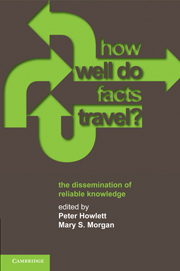Crossref Citations
This Book has been
cited by the following publications. This list is generated based on data provided by Crossref.
Girel, Mathias
2013.
From Doubt To Its Social Articulation.
European Journal of Pragmatism and American Philosophy,
Vol. V,
Issue. 2,
Davies, Gail
Frow, Emma
and
Leonelli, Sabina
2013.
Bigger, faster, better? Rhetorics and practices of large-scale research in contemporary bioscience.
BioSocieties,
Vol. 8,
Issue. 4,
p.
386.
de Lizardi, Carlos Guerrero
2015.
Complex stylized facts of the Mexican economy: a hirschmanian perspective (to attack the “fear of growing”, more and better).
Contaduría y Administración,
Vol. 60,
Issue. 2,
p.
291.
Morgan, Mary S.
2015.
Moving forward on models.
Journal of Economic Methodology,
Vol. 22,
Issue. 2,
p.
254.
Krause, Monika
2016.
‘Western hegemony’ in the social sciences: fields and model systems.
The Sociological Review Monographs,
Vol. 64,
Issue. 2,
p.
194.
Krause, Monika
2016.
‘Western Hegemony’ in the Social Sciences: Fields and Model Systems.
The Sociological Review,
Vol. 64,
Issue. 2_suppl,
p.
194.
Smith, Andrew
and
Greer, Kirsten
2017.
Uniting business history and global environmental history.
Business History,
Vol. 59,
Issue. 7,
p.
987.
Boyd, Nora Mills
2018.
Evidence Enriched.
Philosophy of Science,
Vol. 85,
Issue. 3,
p.
403.
Ultramari, Clovis
Cantarim, Fernanda
and
Jazar, Manoela
2019.
Latin American Cities: From Subservient Reproductions to Intercontinental Dialogues.
Humanities,
Vol. 8,
Issue. 1,
p.
18.
Lowe, Alan
Nama, Yesh
Bryer, Alice
Chabrak, Nihel
Dambrin, Claire
Jeacle, Ingrid
Lind, Johnny
Lorino, Philippe
Robson, Keith
Bottausci, Chiara
Spence, Crawford
Carter, Chris
and
Svetlova, Ekaterina
2020.
Problematizing profit and profitability: discussions.
Accounting, Auditing & Accountability Journal,
Vol. 1233,
Issue. 4,
p.
753.
van Netten, Djoeke
2020.
Motion in Maps, Maps in Motion.
ChoGlueck, Christopher
2021.
DRUG FACTS, VALUES, AND THE MORNING-AFTER PILL.
Public Affairs Quarterly,
Vol. 35,
Issue. 1,
p.
51.
Krause, Monika
2021.
On Sociological Reflexivity.
Sociological Theory,
Vol. 39,
Issue. 1,
p.
3.
Serlin, David
2021.
Guns, germs, and public history: A conversation with Jennifer Tucker.
Journal of the History of the Behavioral Sciences,
Vol. 57,
Issue. 1,
p.
60.
Hirschman, Daniel
2022.
Controlling for What? Movements, Measures, and Meanings in the US Gender Wage Gap Debate.
History of Political Economy,
Vol. 54,
Issue. S1,
p.
221.
Bandola-Gill, Justyna
2022.
Statistical entrepreneurs: the political work of infrastructuring the SDG indicators.
Policy and Society,
Vol. 41,
Issue. 4,
p.
498.
Woolcock, Michael
2022.
The Case for Case Studies.
p.
87.
Huggett, Jeremy
2022.
Data Legacies, Epistemic Anxieties, and Digital Imaginaries in Archaeology.
Digital,
Vol. 2,
Issue. 2,
p.
267.
Cartwright, Nancy
2022.
The Case for Case Studies.
p.
29.
Twining, William
2022.
Evidential Legal Reasoning.
p.
13.



